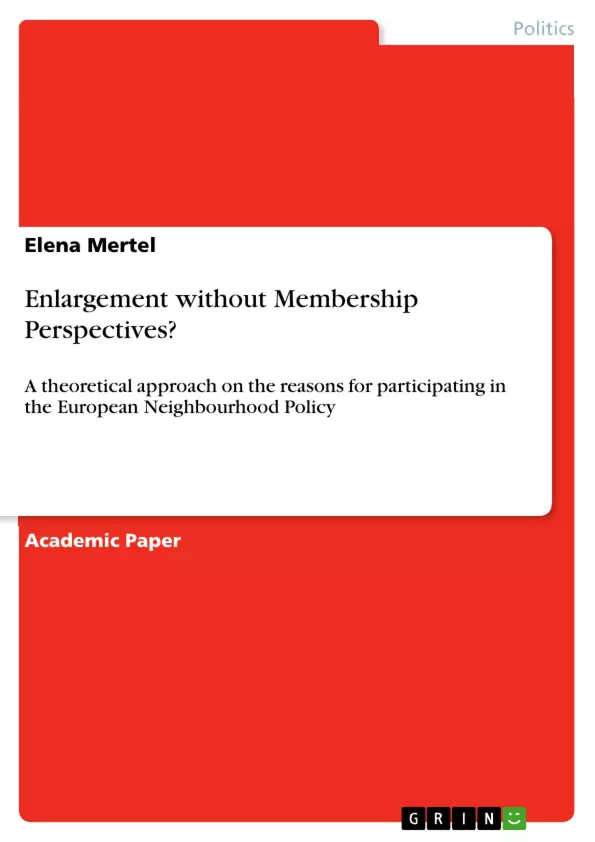The significance of the Eastern European area for the European Union has become visible with the Eastern enlargement in 2004.
Ever since then the question remains how to interact with the bordering neighbor countries. This paper aims to examine the
European Neighbourhood Policy from a rationalist-constructivist perspective. Furthermore, parallels between the decision-making
process for the Eastern enlargement will be drawn by paying special attention to Frank Schimmelfennig's contributions to the
issue. I conclude that despite the absence of accession talks, a potential future accession perspective displays the highest
incentive for Eastern neighbors to participate in the ENP and that there is a possibility for renegotiating accession by making use of rhetorical action.
Inhaltsverzeichnis (Table of Contents)
- Abstract
- Introduction
- Rationalist, sociological institutioalism or both?
- Summary of The EU, NATO and the Integration of Europe - Rules and Rhetoric
Zielsetzung und Themenschwerpunkte (Objectives and Key Themes)
This paper analyzes the European Neighbourhood Policy (ENP) from a rationalist-constructivist perspective, drawing parallels to the decision-making process of the Eastern enlargement. It examines the reasons for Eastern European countries to participate in the ENP, considering the potential for future accession.
- The role of the European Neighbourhood Policy in promoting cooperation between the EU and its Eastern neighbors.
- The impact of the ENP on individual Eastern European countries.
- The theoretical framework of rationalist institutionalism and sociological institutionalism as applied to the ENP.
- The significance of rhetorical action in shaping EU policy decisions.
- The potential for future accession for Eastern European countries participating in the ENP.
Zusammenfassung der Kapitel (Chapter Summaries)
- The introduction sets out the paper's objective to explore the ENP from a theoretical perspective, drawing on the work of Frank Schimmelfennig. It introduces the central question: why did Eastern European countries decide to participate in the ENP, despite lacking accession perspectives?
- The chapter titled "Rationalist, sociological institutionalism or both?" provides a summary of Schimmelfennig's book "The EU, NATO and the integration of Europe - Rules and Rhetoric." It highlights the key arguments of the book, namely that the Eastern enlargement was driven by both rationalist and sociological institutionalist factors, with rhetoric playing a significant role in shaping the decision-making process.
Schlüsselwörter (Keywords)
This paper focuses on the European Neighbourhood Policy, Eastern Enlargement, rationalist institutionalism, sociological institutionalism, rhetorical action, and the European Union. It investigates the theoretical underpinnings of the ENP and the incentives for Eastern European countries to participate in this policy framework.
Frequently Asked Questions
What is the European Neighbourhood Policy (ENP)?
The ENP is a policy framework of the European Union aimed at fostering cooperation with its neighboring countries to the East and South, without necessarily offering immediate membership.
Why do Eastern neighbors participate in the ENP without a membership perspective?
The paper concludes that a potential future accession perspective remains the highest incentive, and countries use "rhetorical action" to keep the possibility of renegotiating accession alive.
What is "rhetorical action" in EU policy?
Based on Frank Schimmelfennig's work, it refers to the strategic use of arguments based on shared community values to influence decision-making and shame opponents into compliance.
What are the theoretical frameworks used in this analysis?
The paper uses a rationalist-constructivist perspective, combining rationalist institutionalism (logic of consequences) and sociological institutionalism (logic of appropriateness).
Who is the key scholar mentioned regarding Eastern enlargement?
The paper pays special attention to the contributions of Frank Schimmelfennig, particularly his analysis of the rules and rhetoric behind EU and NATO integration.
- Arbeit zitieren
- Elena Mertel (Autor:in), 2018, Enlargement without Membership Perspectives?, München, GRIN Verlag, https://www.grin.com/document/498130



